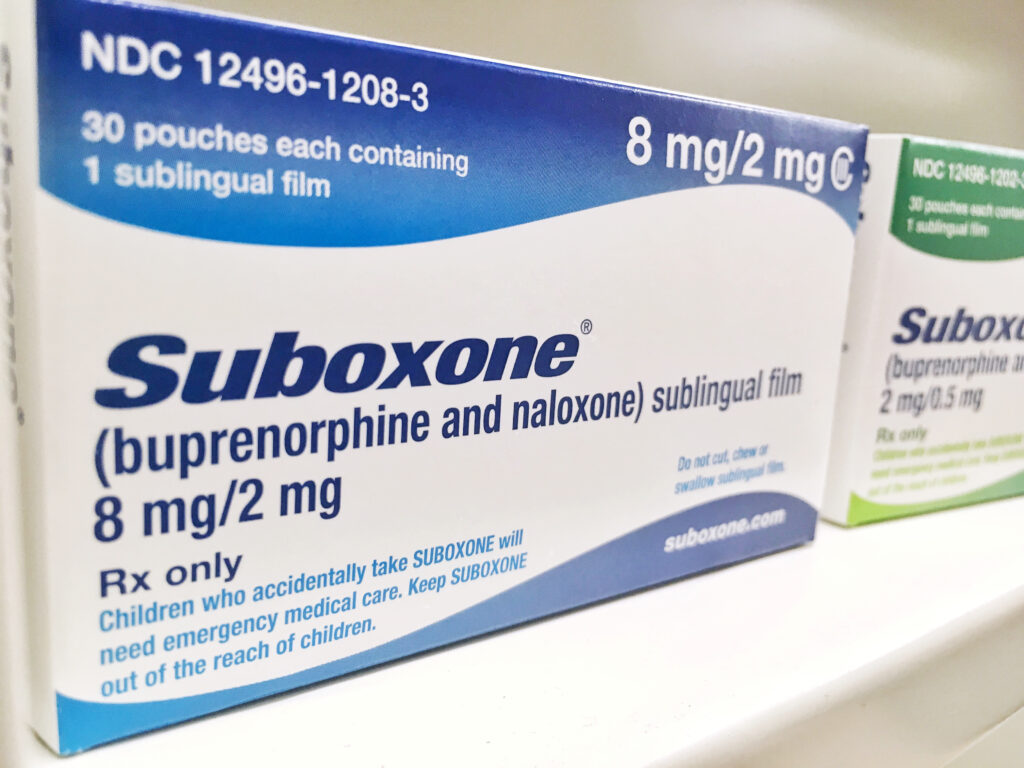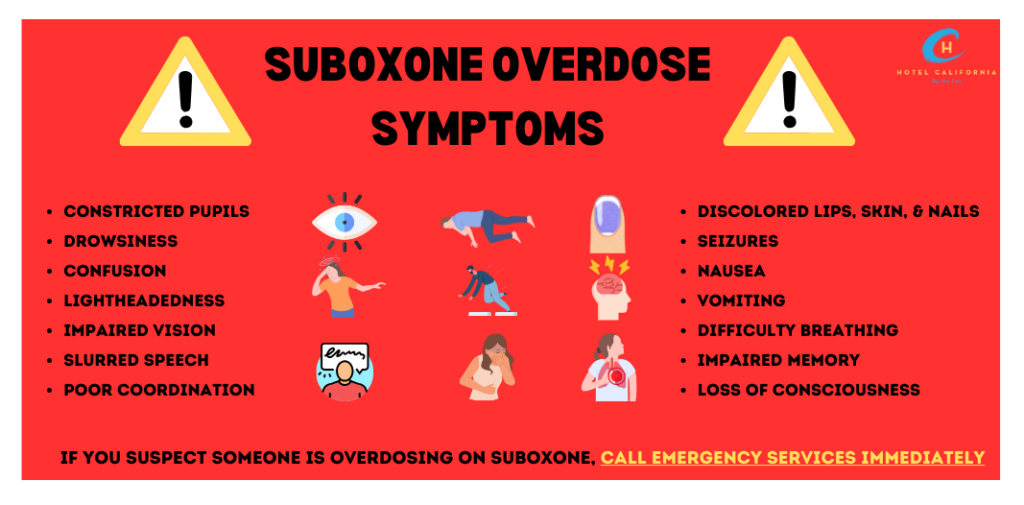Can you Overdose from Suboxone?
Suboxone is a prescription medication often used in the treatment of opioid use disorder. The Schedule III Controlled Substance is a long-acting opioid that works to reduce opioid withdrawal symptoms. It is a powerful medication that can eliminate severe withdrawal symptoms as well as control and manage drug cravings. According to the American Society of Addiction Medicine, Suboxone is one of the recommended treatments for managing opioid use disorder. The prescription drug was designed to be a safe alternative with a low risk of addiction and overdose.

The main active ingredients in Suboxone are buprenorphine and naloxone. Despite being an opioid, addiction and overdose from Suboxone is low and not a common occurrence compared to full opioids. A person is more likely to overdose on Suboxone if they have never taken opioids before. A person is also more likely to overdose on Suboxone if they are mixing with other substances such as opioids, benzos and alcohol.
In a July 2019 study, research found that only 2.6% of all opioid-related overdose deaths involved buprenorphine, which is the active ingredient in Suboxone. The risk of overdose is mainly associated with the ingredient buprenorphine. However, because Suboxone contains such a low dose of the opioid, developing an addiction and experiencing an overdose is not as likely.
What is Suboxone?
Suboxone consists of naloxone and buprenorphine. Naloxone is an opioid antagonist that helps to discourage the misuse of opioids by immediately blocking the effects and sending a person into withdrawal. Buprenorphine produces similar effects as full opioid drugs. It is a partial agonist-antagonist that binds with the opioid receptors to blunt and block the effects of opioids, which helps to reduce withdrawal symptoms and drug cravings.
During opioid use disorder treatment, Suboxone satisfies the brain’s need for opioids without causing a full-on euphoric experience. For this reason, the drug’s ability to help prevent opioid misuse is considered a greater benefit that outweighs the low risk for misuse and dependence.
The effects of Suboxone can take into effect in about 20-45 minutes and last between 24-72 hours. Common side effects include headache, anxiety, insomnia, sweating, depression, constipation, nausea, weakness, fatigue, problems breathing liver damage, hormone problems and severe withdrawal symptoms. Long-term misuse can lead to physical and psychological dependence and addiction.
However, Suboxone produces what is known as a ceiling effect. This means that despite increasing levels of ingested Suboxone, a person taking the drug will not be able to get “more high.” The sedative and respirator’s depressing effects will taper off at higher doses despite a user’s attempt to take more in order to feel more.

Can you Overdose from Suboxone?
Yes, you can overdose from Suboxone. However, it is very rare. There are a few factors that put users at higher risk for Suboxone overdose.
- People who have never taken Suboxone or any opioid before are at higher risk of developing an addiction and overdosing. These users generally have a low opioid tolerance. The majority of Suboxone users are using the medication to help treat their opioid use disorder. Someone who is new to the drug is more susceptible to the sedative effects because their body has not built up a tolerance for the drug.
- Taking a higher dose than recommended by your health care provider can put you at risk for overdose. With most medications, taking a higher dose means creating stronger effects. In someone who has never taken opioids before, this could greatly impact the risk of overdose. However, Suboxone does have a ceiling effect in which a user can only reach a certain level of its effects before it starts to taper off.
- Mixing Suboxone with other substances creates a greater chance of addiction and overdose. When mixed with other central nervous system depressants such as alcohol, opioids and benzos, it can increase the risk of sedation. Alcohol causes drowsiness, headache and vomiting when taken with Suboxone and can also result in difficulty breathing. When taken with benzos, the combination can cause respiratory failure, impair cognitive judgment and cause lack of coordination. When used with cocaine, Suboxone can lessen the effects of cocaine and make users believe they can ingest more of the drug and cause a build-up of toxicity in the body.
- Premature discontinuation of Suboxone can also put a person at risk for withdrawal, cravings relapse and overdose. The best way to stop using the medication is to gradually taper off the drug under the care and guidance of a clinical specialist.
- Some users take Suboxone, purely to get high and experience its sedative effects.
- Users who have a history of medical health conditions such as liver problems, kidney disease and cardiovascular issues are a high risk for experiencing a Suboxone overdose.
Check Your Insurance Coverage for FREE
Find out if your insurance covers addiction treatment in minutes. We accept most insurance!
Symptoms of Suboxone Overdose
- Impaired memory
- Blurred vision
- Confusion
- Reduce coordination
- Slurred speech
- Fading in and out of consciousness
- Dizziness
- Nausea
- Flu-like symptoms
- Intense feeling of sleepiness
- Yellow discoloration of eyes
- Hallucinations
- Anxiety and depression
- Loss of focus
- Low blood pressure
- Slowed heart rate
- Seizure
- Coma
What are some of the best ways to prevent a possible Suboxone overdose? One way is to take the medication as prescribed by your medical healthcare provider. Using the drug in other ways than recommended can lead to a high risk of overdose and other complications. Update your healthcare provider with symptoms you may be experiencing while on the medication. That way they can monitor you to make sure you are receiving the correct and effective dose of the medication. Do not use Suboxone with other mind-altering substances, especially other sedative medications, as this can depress breathing and send a person into overdose and coma.
If you happen to overdose on Suboxone, one way to treat the condition is to administer a dose of naloxone. Naloxone will work to reverse any opioid overdose effects and immediately send the user into withdrawal.
Reach out to Hotel California by the Sea
We specialize in treating addiction and other co-occurring disorders, such as PTSD. Our Admissions specialists are available to walk you through the best options for treating your addiction.
Are you looking for Opioid Use Disorder Treatment?
Can you overdose from Suboxone? Yes. However, it is not common. One of the main reasons why it is unlikely you will overdose on Suboxone is because it does not slow down respiration enough to cause you to completely stop breathing, even at a very high dose. When taking the drug as prescribed by a medical provider, it is safe and effective.
The drug’s ceiling effects also make it less likely that a person would compare the drug with other opioids. Suboxone can be an effective treatment for opioid use disorder. On the rare occasion that you do develop a tolerance and addiction to Suboxone, specialized behavioral treatment centers can provide help and support for clients in all stages of addiction and recovery.
We provide all levels of care including detox, residential, PHP and IOP. We also utilize evidence-based techniques such as CBT, DBT and EMDR therapy. At Hotel California by the Sea, we are dedicated to helping our clients address every aspect of their addiction. Through a combination of medication-assisted treatments and cognitive behavioral treatments, clients will learn effective techniques to manage distressing emotions and triggering feelings often associated with their drug use. This in turn will help them overcome their addiction and live happier life in recovery.
References:
https://www.drugs.com/medical-answers/you-overdose-suboxone-3536143
https://ophelia.com/blog/can-you-overdose-on-suboxone
https://www.discoverynj.org/can-you-overdose-on-suboxone
https://www.medicalnewstoday.com/articles/325827
https://anrclinic.com/blog/suboxone-overdose
https://www.bicyclehealth.com/suboxone-faq/overdose-on-suboxone
